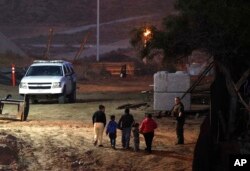A 7-year-old girl who crossed the U.S.-Mexico border with her father last week died after being taken into the custody of the U.S. Border Patrol, federal immigration authorities have confirmed.
According to a Washington Post report, the girl died of dehydration and shock about eight hours after she was arrested by agents near Lordsburg, New Mexico. The girl was from Guatemala and was traveling with a group of 163 people who approached agents to turn themselves in on Dec. 6.
The U.S. Department of Homeland Security (DHS) said the girl began having seizures while in border patrol custody. The agency's medical personnel determined the child had a fever of 41 degrees Celsius. The child was taken by air ambulance to El Paso, Texas where she died less than 24 hours after going into cardiac arrest.
DHS did not identify the cause of death and said an autopsy will take several weeks. In the meantime, the agency is conducting its own investigation to insure all "appropriate policies were followed."
DHS Secretary Kirstjen Nielsen, speaking on Fox News, in part blamed the size of the group that was turning itself in and its location. "They were about 90 miles (145 kilometers) away from where we could process them," she said. Nielsen added, "We gave immediate care," and "we'll continue to look into the situation."
A Department of Homeland Security spokesman defended U.S. Customs and Border Patrol late Thursday.
"Border Patrol always takes care of individuals in their custody and does everything in their power to keep them safe. Every year, the Border Patrol saves hundreds of people who are overcome by the elements between our ports of entry," the spokesman said.
DHS also took advantage of the opportunity to warn against the dangers of migration.
"As we have always said, traveling north illegally is extremely dangerous. Drug cartels, human smugglers and the elements pose deadly risks to anyone who comes across the border illegally," the spokesman said. "We are begging parents not to put themselves or their children at risk by entering illegally."
The Post reports that CBP said in a statement that the girl had not eaten or consumed water in several days. That statement, which has been shared with other media, raises questions about whether the girl's condition was evident to Border Patrol personnel and whether she was given anything to eat or drink while in custody.
Immigration attorneys and other rights activists have raised issues about the conditions at Border Patrol holding cells as well as Immigration and Customs Enforcement detention centers.
A lawsuit filed in Tucson, Arizona, alleges that the conditions in holding cells there were less than adequate.
"They have been packed into overcrowded and filthy holding cells with the lights glaring day and night; stripped of outer layers of clothing and forced to suffer in brutally cold temperatures; deprived of beds, bedding and sleep; denied adequate food, water, medicine and medical care," the plaintiffs stated in a June filing.
A Tucson judge has ordered that blankets and mats be provided in facilities along the Arizona-Mexico border and is monitoring surveillance footage of the holding cells.
The Border Patrol has seen an increasing trend in large groups of immigrants, many with young children, walking up to agents and turning themselves in to authorities. Most are Central American, say they are fleeing violence and seek to request asylum.
The death of the 7-year-old comes after a toddler died in May just after being released from an ICE family detention facility in Texas.
The agency did not release the name of the Guatemalan girl or her father, but he remains in El Paso, awaiting a meeting with Guatemalan consular officials.
"On behalf of the Department of Homeland Security, our sincerest condolences go out to the family of the child. Border Patrol agents took every possible step to save the child's life under the most trying of circumstances. As fathers and mothers, brothers and sisters, we empathize with the loss of any child," the DHS spokesperson said in a statement.
The Associated Press contributed to this report











